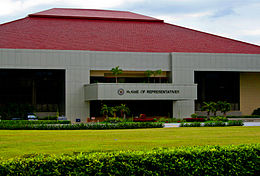Group invokes people’s initiative vs dynasties
MANILA, Philippines—Invoking a “people’s initiative,” a group of concerned citizens filed a bill in the House of Representatives seeking the prohibition of political dynasties.
In filing “The People’s Antipolitical Dynasty Act” in the Lower House on Friday, members of the Movement Against Dynasty Inc. (MAD) invoked Republic Act No. 6735, or the Initiative and Referendum Act, which states that any “accredited people’s organization” may file a petition for indirect initiative in the House of Representatives and other legislative bodies.”
At the weekly Fernandina forum in San Juan City on Wednesday, Danilo Olivares, MAD cochair, said the group was already gathering the signatures of at least 3 percent of the population of each legislative district to back up their indirect initiative for the passage of an antidynasty law.
An “indirect initiative” would force legislators to give top priority to the people’s measure in legislative processes.
The 24-page proposed law, a copy of which was given to the Inquirer, signed by Q, MAD chair and lead convenor, was submitted to the House’s records section.
Summary procedure
Copies would also be given to the Senate and the Commission on Elections (Comelec).
In the bill, the group proposed to have the Comelec declare a political clan a “political dynasty” after its members have been subjected to a summary procedure in which “substantial evidence” to declare them as such has been presented by the state.
While the “accused” clan has the option of filing an appeal, the proposed bill said that as soon as a political clan is declared a political dynasty “with finality,” its members are prohibited from running or holding public office.
The group defined political dynasty as “the concentration, consolidation and/or perpetuation of elective public office and political power by two or more persons related to one another as spouses and/or by consanguinity and/or affinity within the fourth civil degree.”
Offenses include using falsified documents to hide one’s ineligibility to run for office, and conspiring with clan members to hide a candidate’s ineligibility. Penalties include imprisonment ranging from 10-12 years, apart from other criminal liabilities.
According to Olivares, the proposed law was “more comprehensive” than any other bill filed in the past.
He said the group was working on gathering the signatures of at least 3 percent of the population of each legislative district so that these could be subsequently attached to the proposed law.
Backing of religious groups
Aside from the fact that a total of 5.2 million signatures from all of these legislative districts were a requirement specified in RA 6735, Olivares said it would also serve as a reminder to members in Congress that those who did not pass the proposed legislation run the risk of losing “that many” votes.
He said so far, the group had garnered around 5,000 signatures from Manila, Cagayan de Oro, Naga, Camarines Sur and La Union since its members began going around the country in February.
He said the group had the backing of major religious groups, such as the Catholic Bishops’ Conference of the Philippines, the United Church of Christ in the Philippines and the National Council of Churches in the Philippines.
He said the group was set to leave for the Autonomous Region in Muslim Mindanao in August to talk to Muslim groups.
“Help us promote this people’s initiative,” he said, adding that political dynasties do not promote a “just” social order.
Dynasties in 73 provinces
He said that of the 80 provinces in the country, 73 are controlled by political dynasties.
Under the law, any duly accredited people’s organization may file a petition for indirect initiative in the House of Representatives, and other legislative bodies.
“The procedure to be followed on the initiative bill shall be the same as the enactment of any legislative measure before the House of Representatives except that the said initiative bill shall have precedence over the pending legislative measures on the committee,” the law states.
Advocates of a Freedom of Information (FOI) Act earlier said they were also considering using the people’s initiative law to force Congress to pass an FOI law.
The majority of lawmakers over the past decades have refused to pass an antidynasty law as well as a freedom of information act.















